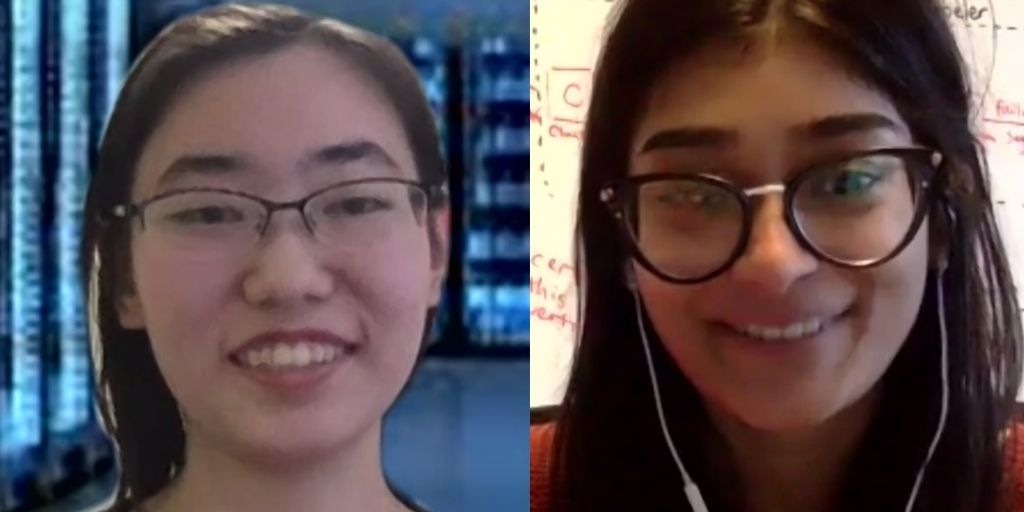
Kicking off the fall quarter by celebrating diversity in computing has become an Allen School tradition. This year the celebration went virtual, with around 80 people logged on to honor students who embody the school’s commitment to diversity and excellence and to hear from members of the community who participated in the Grace Hopper Celebration, the world’s largest gathering of women technologists, and the ACM Richard Tapia Celebration of Diversity in Computing, which brings together people of all backgrounds, abilities and genders in computing.
Allen School director Magdalena Balazinska welcomed participants to the celebration by highlighting some of the programs the Allen School has invested in to increase diversity, equity and inclusion, For example, the school has partnered with the College of Engineering’s STARS program and AccessCSForAll in order to nurture promising talent to bring to the Allen School and the field of computing. Balazinska also highlighted three student-led groups focused on supporting a diverse and inclusive community: Minorities in Tech (MiT), Gen1 and Q++. Following Balazinska’s remarks, professor Tadayoshi Kohno, the school’s associate director for diversity, equity and inclusion, spoke about new high school and summer programs the school is creating to find more students having diverse backgrounds and experiences. Other actions include conducting faculty searches at more diverse research institutions and posting open staff positions on more inclusive job posting websites.
During the diversity celebration, in a panel discussion hosted by Les Sessoms, The Allen School’s recruitment and retention specialist, Ph.D. student Samia Ibtasam in the Information and Communication Technology for Development Lab, and undergraduates Ximing Lu and Marisa Radensky talked about their initial interest in studying computer science and about their positive experiences at the conferences. Ibtasam said it was an inspiring experience to see other students like her represented at Grace Hopper, explaining that she felt like she was home. Each of the panelists felt the conferences opened up new opportunities that they didn’t know were available to them.
In addition to serving on the panel, Lu was recognized with the Lisa Simonyi Prize. Longtime friends of the school Lisa and Charles Simonyi established the scholarship to recognize and support students who exemplify excellence, leadership, and diversity. Lu, who is a double major in computer science and statistics, is a highly accomplished researcher. She has worked with Allen School and Electrical & Computer Engineering professor Linda Shapiro on the automated classification of cancer biopsy images; Allen School professor Yejin Choi on natural language generation; and Allen School professor Kevin Jamieson and Materials Science & Engineering professor Mehmet Sarikaya on neural network approaches for molecular analysis. She has also been a software developer with the Avionics Team of the UW Society for Advanced Rocket Propulsion, and with the UW Sensors, Energy and Automation Laboratory.
“Ximing has had a busy undergraduate career, earning a high GPA taking both undergraduate and graduate classes, interning, and working on several research projects,” Shapiro said. “I’m happy to see her hard work is paying off.”
Lu’s research over two and a half years has culminated in four major paper submissions. She is the lead author on one of the papers, “NeuroLogic Decoding: (Un)Supervised Neural Text Generation with Predicate Logic Constraints.”
“Ximing is hands down the best and the most promising undergraduate student I’ve ever seen or worked with over the past six years since I arrived at the University of Washington,” said Choi. “Not only is she extremely fast and technically strong, which I’ve seen before a few times, but she’s bursting with creative ideas, which is very rare. She also has enormous energy and enthusiasm for research at all levels of execution, which is even less common.”
Sanjana Chintalapati, a junior studying computer science, was awarded the Allen AI Outstanding Engineer Scholarship for Women and Underrepresented Minorities from the Allen Institute for Artificial Intelligence (AI2). The scholarship was created to encourage students from underrepresented groups to excel in computer science and engineering and become leaders and role models in their fields.
“Sanjana discovered something we try to emphasize: that success in computer science is much more dependent on committing oneself to constant learning and much less dependent on having a natural knack for it,” Balazinska said.
Chintalapati is interested in accessibility and is currently working on multiple projects that use computing to assist people with disabilities, including an app that assists disabled users who are using transit stations. The app is designed to alert users when an elevator is out of service that would prevent them from accessing the train or bus. Allen School professor emeritus Oren Etzioni, the CEO of AI2, said during the program that in an imposing field of applicants for the scholarship, Chantalapati stood out. The selection committee could tell how passionate she is about using technology for good, which Etzioni noted aligns well with the mission of AI2.
Thanks to the Simonyis and AI2 for supporting diversity and excellence, and thanks to everyone who logged on to celebrate the people who are making our school and our field a more welcoming destination for all. And congratulations to Ximing and Sanjana!
For more about the Allen School’s efforts to advance diversity in computing, please visit our website.

